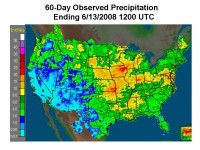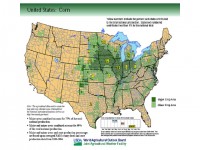By Timothy Gardner, Reuters
Floods in the Midwest that have pushed corn prices to record levels have wiped out profits for making U.S. ethanol and threaten to sink production of the fuel below government mandates. “If it’s simply economically impossible to make ethanol. then (the government) may have to amend or suspend the Renewable Fuel Standard,” analyst Pavel Molchanov at Raymond James and Associates in Houston said by telephone. The floods ravaging the corn crop across at least eight states, including Iowa and Illinois, at a time of growing global demand have put another roadblock before the U.S. biofuels policy. Hoping to wean the country off foreign oil, the Bush administration has boosted incentives and mandates for alternative fuels made from food crops. Many have blamed those steps for lifting food prices at a time of mounting hunger problems.
Corn prices for the new-crop July 2009 corn hit a record near $8 per bushel on Friday, while old-crop also hit a record above $7. Molchanov estimated that average U.S. producers now lose 8 cents for every gallon of ethanol distilled, compared with a profit margin of 20 cents a gallon two weeks ago. Besides higher corn prices, margins also have been squeezed by two-year highs for natural gas, which fires most ethanol plants. As much as 2 billion to 5 billion gallons of ethanol “could go offline in the next few months due to high corn prices,” a Citi Investment Research note said. U.S. ethanol production capacity is about 8.8 billion gallons per year from 154 distilleries. “If the ethanol is not there, I don’t think the government expects blenders to blend as much,” said Ron Oster, an analyst at BroadPoint Capital in St. Louis. Read more here.

See 60 day US rainfall above and in larger image here

See larger image of Corn Belt states (with average % of production) here
The Orange County Register
The nation avoided global warming-related devastation last week. The Senate killed a grandiose scheme to clamp down on emissions of CO2, a benign, necessary, natural atmospheric gas. However, something similar, if not worse, will be back next year.
The devastation wouldn’t have been the 1- or 2-degree temperature increases that may have occurred over the next century, which may not even be related to CO2. The real devastation would have been gasoline prices increasing $1.40 per gallon by 2050, millions of jobs lost or shipped overseas, an effective $3,700-a-year tax on families, a 33-percent increase in home energy costs by 2020, and, says the Heritage Foundation, the equivalent economic cost of 35 Hurricane Katrinas every year for two decades.
Those would be certain results of the failed Climate Security Act’s vastly expanded government controls to extract trillions of dollars from productive companies and redistribute the money to politically favored interests, say the bill’s opponents.
What’s uncertain is whether the trouble and expense would have bought anything. Even if CO2 emissions are returned to the level of horse-and-buggy days, an increase of 0.013 degree Celsius might be avoided over the next century, says climatologist Patrick Michaels. That’s if CO2 increases temperature, which many scientists doubt. So, why go down this path?

“Controlling carbon is a bureaucrat’s dream,” MIT climate scientist Richard Lindzen said. “If you control carbon, you control life.” Global warming is the perfect big-government issue. First, it’s predicated entirely on predicted disasters based on arbitrary data fed into computers. What’s fed changes continuously. That’s why a few years ago sea levels were predicted to rise 20 feet, but now only 20 inches or less. Garbage in, garbage out.
Second, global warming is unscientific because it can’t be disproved. When temperatures slightly dropped over the past decade, then were predicted even by alarmists to drop more over the next decade despite ever-rising CO2, rather than admit their theory is wrong, the story line changed. Now we’re told the entirely unpredicted 20-year cooling is only temporary. If temperatures go up, it proves global warming. If they go down, voila! It proves global warming.
Disguised as a “cap-and-trade” plan, it would have made CO2 emitters pay to do what they’ve always done for free. Deceptively passed off as a market-based plan, cap-and-trade is really a hidden tax. Senate Majority Leader Harry Reid assured us, “Gas prices will not go up. They will go down.”

In the end, the obvious connection to ever-higher gas prices politically killed the Climate Security Act. Next year another version is certain to return with a president inclined to sign it. We had a preview of the future last week. It’s grim, costly and authoritarian. Read nore here.
By Paul Driessen
Locking up energy, driving up prices and destroying jobs to “save the planet”.
There is no distinctly native American criminal class, Mark Twain observed - except Congress.
A century later, government power and intrusiveness have increased exponentially - and special interests have adapted by employing lobbyists who can navigate Washington, explain technology to tech-challenged members and staffs, persuade legislators that provisions are vital (or disastrous), and give clients “a seat at the table” where subsidies, mandates, taxes, preferences and penalties are meted out.
The system is both the cause and result of far too many congressmen becoming members of what commentator Charles Krauthammer calls an “ambitious, arrogant, unscrupulous knowledge class” that has arrogated unto itself the right to rule American citizens. Even legislators who don’t keep wads of thank-you cash in their freezers have committed misfeasance and malfeasance, by handling vital energy, environmental and economic matters in ways that would likely be prosecuted if done by businessmen. Lawmakers, eco-activists and companies routinely engage in social experimentation and central planning akin to previous Great Leaps Forward - and refuse to acknowledge the damage their actions inflict on workers, families, minorities and other businesses.
Today, in the name of protecting the environment, politicians have locked up enough oil, gas, coal and uranium to power the United States literally for centuries. Representatives of six of the nation’s eight biggest petroleum-guzzling states routinely vote to ban drilling off our coasts and in Alaska’s Arctic National Wildlife Refuge. The Interior Department estimates that these lands could hold more than the proven oil reserves of Iran or Iraq: 139 billion barrels that could be obtained with today’s technology.
This energy belongs to all Americans. But politicians keep it off limits, and force us to consume oil that the rest of the world desperately needs. Food and fuel prices soar, poor families get pummeled, and we are compelled to send trillions of dollars to corrupt dictators, and give up jobs, tax revenues, royalties and security that developing US resources would generate.
Read more here.
See Roy Innis of CORE’s Open Letter to Congress on this issue here.
Paul Driessen is senior policy advisor for the Congress of Racial Equality and author of Eco-Imperialism: Green power ∙ Black death.


